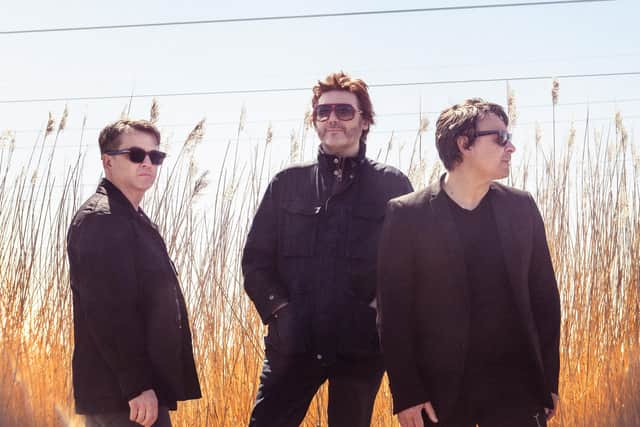Manic Street Preachers: ‘It’s trying to make sense of this illusion that we couldn’t even grab, touch or blow away’


The show, at St David’s Hall in Cardiff for BBC Radio 2, had gone OK, he says, considering the audience was limited to 150 invitees; he is, though, “yearning” for a greater emotional release. “I’m still looking for that physical moment where it feels like people are drunk, it feels like people have disregard for each other’s personal space and you go for it,” he says.
Hopefully such times are not too far around the corner thanks to vaccination efforts, but in the meantime the Manics have a show to look forward to next week at Halifax Piece Hall plus an autumn tour that includes gigs in York and Leeds.
Advertisement
Hide AdAdvertisement
Hide AdThe dates correspond with the band’s 14th studio album, The Ultra Vivid Lament. Bradfield thinks their creative process for this record was helped by the fact he and bandmates Nicky Wire and Sean Moore already had key songs The Secret He Had Missed, Orwellian and Happy Bored Alone written before lockdown. “So we already had found some kind of direction,” he says. “Two of the songs had been written on piano and it was a bit gentler in tone. Early on in the first three songs I was obsessed with people being able to hear the lyrics. I was already aware that Nick was giving me a very concise, pointed but yet subtle set of lyrics. I thought, ‘Wow, this is really on-point and he’s really on form, he’s really being as honest as he can possibly be without being brutal’. It was so communicative in such a poetic way, so I became obsessed with creating space for the vocal which would carry the lyric.”
During Wales’s strict lockdowns, Wire continued to send Bradfield lyrics through the post, despite the fact that they only live 12 miles apart. “That was a bit of romance, which I liked,” the singer says, “and I started writing on the piano in my house. I just thought, ‘I’ve got to try and make sense of the time that’s being killed and turn it into living hours again’.”
Among those lyrics was Diapause, a dark treatise on “the dying state an animal goes into before it thinks its days are up”, and Quest For Ancient Colour and Black Diary Entry. “Very mixed experiences just trying to make sense of this illusion that we couldn’t even grab, touch or blow away, like a sunflower seed,” Bradfield says. “We couldn’t do anything with this new reality that was in front of us and these lyrics seemed to be trying to figure that out, and that really helped me in a sense. It was if the lyrics guided me through lockdown.”
The “communicative” nature of Wire’s lyrics nudged Bradfield to be more expansive – a direction he likens to “London Calling-era Clash playing Abba”. “I didn’t want to be playing the guitar with a clenched fist and I didn’t want to be singing these words with a grimace on my face,” he says. “I wanted the performance, the delivery, to be as open as the words themselves.” The apparent tinges of melodic melancholy he says reflect “the sound of a lyric realising its doom, its defeat, but thinking that it’s turned the corner, now it’s starting again. You realise your fallibilities, your mistakes, and perhaps now we can turn the corner.”
Advertisement
Hide AdAdvertisement
Hide AdSuch sentiments are what he appreciates in the work of Abba, he says. “I know it’s an oxymoron but there’s a hollowness there that has such endless depth,” he says. “Whether it be The Day Before You Came or Eagle or The Winner Takes It All or Knowing Me, Knowing You, those songs just admit defeat, they just say, ‘I’m sorry, I’m broken’. That hollowness – you put a pebble into that pool and it just keeps dropping and dropping. It has such depth because the honesty is so stark. With Abba, it helps because the language is a bit more simplistic because it’s their second language, but it becomes even more straight to the point and even more heart-breaking therefore.”


Thirty-five years on from Manic Street Preachers’ formation in Blackwood, Bradfield looks back on those formative years with considerable fondness. “Especially because of the times we were in,” he says. “I liked the nature of the music press back then, it was a good battleground.
“I loved the NME, I loved Melody Maker, I loved Sounds, I loved the combativeness of people like Mark E Smith, Ian McCulloch, Morrissey – all these people having a go at each other. Not caring about whether they were really harming each other at all, just going at it with words. Musicians, especially singers and lyricists loved having sparring battles with other singers and bands, and there was a thing about that which was really sporting in a way. I liked the sport of it.
“Interviews used to be a really good art form and meeting a journalist that you respected and you were slightly fearful of was an event. I remember the first time we met with Steven Swells to have an interview with him, we’d done homework, we were ready for him and he was definitely ready for us. Just meeting a journalist who you knew had the power of prose at the end of his pen, who had really mastered the fine art of taking a band apart with his pen, was a nerve wracking experience but enjoyable.
Advertisement
Hide AdAdvertisement
Hide Ad“So I loved that about the times we were in, I loved the fact that touring was kind of hard and it was just about how good you were. You had to tour and tour and tour and I really got into that, I loved the work aspect of it and the voyage of discovery you have when you’re young. By the time I had been in a band I hadn’t flown, the only other country I’d been to was England, I’d never had a courgette.
“The first time I got smoked salmon when I was with the band I whispered to the tour manager, ‘They haven’t cooked it’. The first time I went to Paris I was really panic stricken because I couldn’t find anywhere that sold Sunday dinner, I was so ignorant about other places and how other people lived.
“I was discovering all of these things on the job and it was just brilliant, it was absolutely amazing. For working class kids from the mining valleys of Wales it was just exciting, I was doing something I loved and I was reading all the time. I wasn’t buying bottles of water and I wasn’t sending texts, now and again you’d get a pager from your management saying ‘You’re No 39 in the charts’.
“I miss those days because you could make sense of everything. If I look at my record collection now one out of every five records I bought because of the review I read. Not because I heard it but because of the review I read, whether it be Steve Sutherland talking about Swans or something, his writing elevated those records, and the writing I’d read about London Calling prepared me for what London Calling was. Otherwise I’d have listened to London Calling for the first time and thought, ‘That’s not punk’, there’s much more rock ’n’ roll in there. But the writing about it, about how they were trying to fold punk into the template of classic rock ’n’ roll lineage and all those reference points they were putting in there, it just prepared me for it.
Advertisement
Hide AdAdvertisement
Hide Ad“I would never have bought a Big Flame record if it hadn’t been for the review I read in the NME, and it was free form indie jazz but it was constructed as such, I would never have bought the Momus record if he hadn’t been described as a latter day Jacques Brel for indie kids on opium. A lot of reviews really elevated records, they informed your vision of what a record could be and already you had a lot of information or you had a lot of subtext that informed what the record was before even hearing it, and I do miss that.
“I miss the way that writing and music went hand in hand back in those days. Even when it was really bad. We’ve been on the wrong end of a lot of bad reviews and a lot of personal stuff about the way you looked and this and that, but if you’re strong enough it does make you better.”
Bradfield says he is particularly looking forward to playing outdoors at the Piece Hall. “I’ve never been to that venue and it looks amazing,” he says. “I go on about people not knowing landmarks in Wales, but I was completely ignorant of this place in Halifax. It seems like one of the best kept secrets in British photo history, so I’m so excited about going there. There’s not many places you don’t feel as if you’ve seen in Britain, but this is one of them.”
Manic Street Preachers play at Halifax Piece Hall on September 10, York Barbican on October 4 and Leeds O2 Academy on October 7. The Ultra Vivid Lament is out on September 10. www.manicstreetpreachers.com
Comment Guidelines
National World encourages reader discussion on our stories. User feedback, insights and back-and-forth exchanges add a rich layer of context to reporting. Please review our Community Guidelines before commenting.